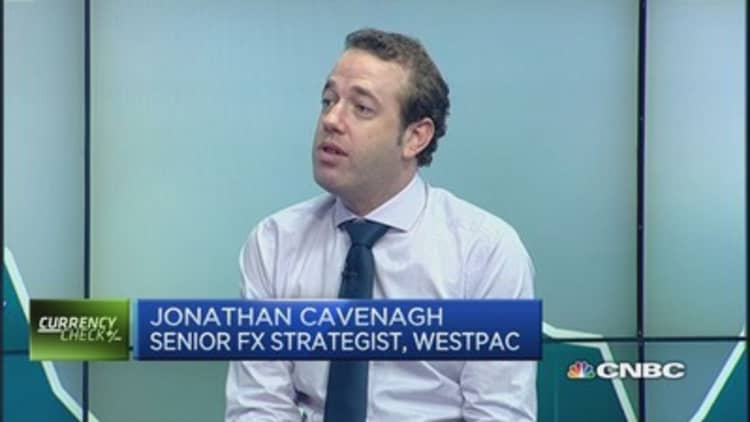The Reserve Bank of Australia's (RBA) decision may come down to the wire at its monetary policy meeting Tuesday, as economists eye an interest rate cut despite policymakers' concerns over a too-strong Australian dollar and home price gains.
"The RBA can't have its cake and eat it," Capital Economics said in a note last week. "The only way to ensure that the Australian dollar weakens, which would support the real economy, is to reduce interest rates further, but this would boost the already hot housing market,"
It expects the RBA's concerns over the real economy will trump worries about bubbly housing prices.
Other analysts, including those at Goldman Sachs, Moody's Analytics and AMP Capital, are also forecasting an interest rate cut of 25 basis-points to a record low of 2 percent in what would be the central bank's first move since February. Spread better IG noted that the swaps market is now pricing a 62 percent chance of a cut.
The case for action remains strong, noted Shane Oliver, head of investment strategy and chief economist at AMP Capital. He cited a weak outlook for business investment and the risk of the Australian dollar rebounding further, but he also cautions that a third straight of month of inaction wouldn't be surprising either.
Targeting the Aussie dollar
Cutting rates will further take the shine off the Australian dollar, often called the Aussie dollar, a necessary step to help the export‐facing service sectors improve, according to Moody's Analytics.
But aiming for a weaker Aussie dollar might not be enough to counter the central bank's concerns over home prices, which have climbed as borrowing costs have fallen. Prices across major cities increased 7.9 percent on year in April, from 7.4 percent in March, according to property consultant CoreLogic RP Data. Affordability has deteriorated, with Sydney households spending 35.1 percent of their income on repayments, higher than the city's 10-year average and up from 32.8 percent in 2014, according to new Moody's data.
Read MoreAussie property's bubbly days are numbered: Goldman
That could keep the RBA on hold.

But Goldman Sachs isn't too worried. "Will rising house prices stop the RBA from easing in May? We think the RBA will look increasingly to the Australian Prudential Regulation Authority to address what is largely a localized surge in Sydney house prices rather than delay easing interest rates any further," Goldman said on Friday.
A lack of trigger
But not everyone expects the RBA will cut rates.
HSBC is expecting the central bank to stand pat, forecasting a 25 basis point cut in the third quarter instead.
The RBA's reluctance to cut rates in March and April "suggests that it may need a convincing trigger to push it over the line," said Paul Bloxham, HSBC chief economist of Australia and New Zealand.
"Although underlying inflation is low enough not to constrain the RBA from cutting, it is not low enough to be an obvious trigger for a cut," he said. March consumer price inflation rose an annual 1.3 percent, below the central bank's 2-3 percent target.
"Although the decision could go either way next week, we expect the RBA to be on hold," Bloxham added.
Comments by Governor Glenn Stevens this week concerning retirement could also be a sign that the central bank will stay on hold, Evan Lucas, market strategist at IG, said.
"The fact that [he said] retirees are now worse off than they were a decade ago may be another reason he won't cut rates further unless forced – and the current data to hand certainly doesn't force anything," Lucas noted, noting the robust 37,700 jobs created in March and a better-than-expected 4 percent annual rise in February retail sales.

